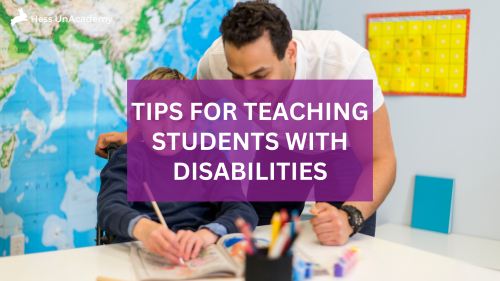Learning Disabilities Masterclass Strategies And Tools

Learning Disabilities Masterclass: Strategies And Tools
Published 10/2025
MP4 | Video: h264, 1280x720 | Audio: AAC, 44.1 KHz, 2 Ch
Language: English | Duration: 1h 27m | Size: 1.41 GB
Learning Disabilities and Inclusive Education: Practical Strategies, AI Tools, Global Insights, and Emerging Innovations
What you'll learn
Understand the core types of learning disabilities, including dyslexia, dyscalculia, dysgraphia, and ADHD, with their neurological and psychological foundations
Identify early warning signs of learning disabilities in children and adolescents through behavioral patterns, academic struggles, and emotional responses.
Students will Explore global perspectives on neurodiversity and how different cultures perceive, address, and support individuals with learning disabilities.
Students will learn to, Apply practical classroom and home-based strategies to support children and adolescents with diverse learning needs effectively.
Evaluate how technology, AI, and digital tools can transform learning experiences for students with disabilities by providing innovative solutions.
Analyze comorbidities & overlaps of learning disabilities, understand how multiple conditions interact to influence academic performance & emotional well-being.
Examine workplace challenges and opportunities for neurodiverse employees, focusing on inclusion, strength-based roles, and supportive corporate strategies.
Students develop empathy and advocacy skills to support inclusive education, promote student rights, and influence policies that empower diverse learners.
Requirements
No prior professional background in psychology is required—just a strong interest in understanding learning disabilities and supporting neurodiverse learners.
Access to a laptop, tablet, or smartphone to watch lectures, explore digital resources, and apply AI-powered learning tools.
Willingness to read short case studies, research insights, and success stories to connect theory with real-world practice.
A curious mindset open to rethinking traditional education and workplace practices through the lens of inclusivity and neurodiversity.
Basic English comprehension to follow along with the course lectures, assignments, and resource materials.
Time commitment of two hours to complete the course, with flexibility to revisit lessons at your own pace.
Interest in exploring AI tools, classroom hacks, and workplace strategies designed for learners with different cognitive styles.
A commitment to applying knowledge in real-world contexts—whether in education, parenting, HR, or personal development.
Description
This course was created using the support of artificial intelligence, alongside expert research and human insights, to give you the most up-to-date, high-quality learning experience in just two hours.A groundbreaking study from the National Center for Learning Disabilities found that 1 in 5 students worldwide struggles with a learning disability—yet most remain undiagnosed until it's too late. That's millions of children and adults facing silent struggles in classrooms and workplaces. But here's the truth: learning disabilities are not limitations—they are different ways of processing information. And with the right strategies, support, and technology, learners can thrive.In this comprehensive Learning Disabilities course, you will explore the most important types of learning disabilities—from dyslexia, dyscalculia, dysgraphia, ADHD, and dyspraxia, to overlaps and comorbidities. We go beyond theory, unpacking real-world success stories, global perspectives, and evidence-based practices. You'll discover why some of the world's most brilliant minds—Einstein, Richard Branson, Simone Biles—turned learning struggles into strengths.This course blends psychology, neuroscience, inclusive education models, and workplace inclusion strategies. You'll learn how to spot early signs of learning disabilities in children and adolescents, how to build supportive home and classroom systems, and how workplaces can embrace neurodiversity as a strength, not a weakness.Technology is at the heart of modern solutions. That's why this course highlights AI tutors, assistive apps, and digital tools that empower learners to bypass barriers. A 2020 study in Computers & Education revealed that students with learning disabilities using assistive technology improved academic performance by 35% more than peers with traditional interventions. In this course, you'll get practical recommendations for the best tools parents, teachers, and professionals can start using today.But this isn't just about tools. It's about changing perspectives. You'll explore inclusive education models like Universal Design for Learning, peer tutoring, and co-teaching. You'll also examine the legal rights and advocacy frameworks—from IEPs and 504 plans to the UN Convention on the Rights of Persons with Disabilities—that ensure students' rights are protected.By the end of this course, you'll walk away not just with knowledge, but with a toolkit of strategies and insights that you can apply immediately—whether you're a teacher, parent, HR manager, or simply someone passionate about neurodiversity.We believe in quality over quantity. In just two hours, you'll gain maximum value—rich with research, case studies, and actionable insights—without unnecessary fluff.Join us today, and be part of a global movement to understand, support, and empower learners with learning disabilities.
Who this course is for
Teachers and Educators who want practical strategies to support students with dyslexia, dyscalculia, ADHD, and other learning challenges inside inclusive classrooms.
Parents and Caregivers seeking to understand their child's struggles, recognize early warning signs, and create supportive home-based learning systems.
School Counselors and Psychologists looking for updated research, real-world interventions, and emotional support frameworks for neurodiverse learners.
HR Professionals and Managers aiming to foster workplace inclusivity, neurodiversity hiring initiatives, and strength-based strategies for employees with learning differences.
Students of Psychology and Education who want to deepen their knowledge of neurodiversity, inclusive education models, and practical interventions.
Therapists and Coaches working with children, adolescents, or adults struggling with learning differences, emotional regulation, and academic performance.
Policy Makers and Advocates who wish to strengthen inclusive education policies and legal rights for individuals with learning disabilities.
Anyone Passionate About Neurodiversity who wants to build empathy, break stereotypes, and learn how to turn challenges into strengths.
https://rapidgator.net/file/2896528e67111d125f40a0db9b444bb2/Learning_Disabilities_Masterclass_Strategies_and_Tools.part2.rar.html
https://rapidgator.net/file/df72a56b9bbde3588b0bc60b75e1a977/Learning_Disabilities_Masterclass_Strategies_and_Tools.part1.rar.html

Information
Users of Guests are not allowed to comment this publication.



